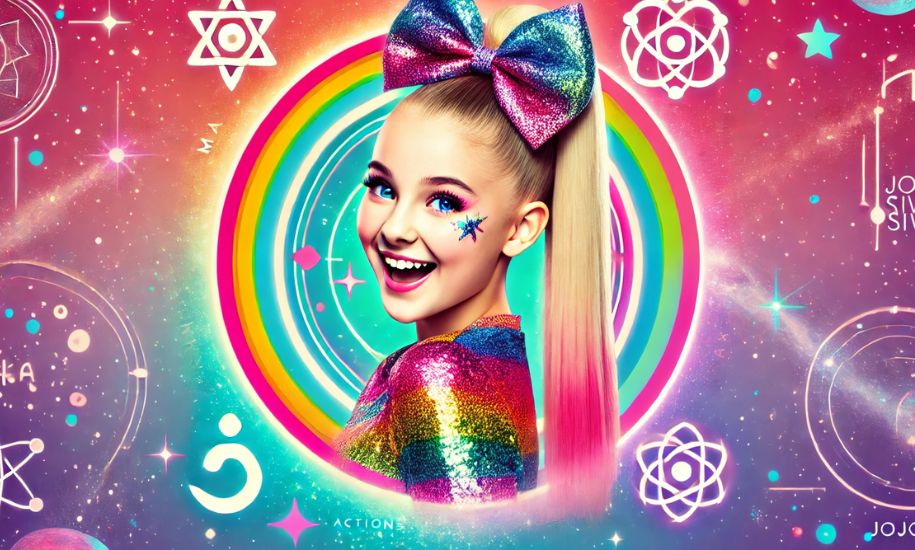When it comes to the entertainment world,karma jojo siwa is a name synonymous with youthful energy, positivity, and an unmistakable sense of individuality. However, beyond her iconic bows, dance moves, and YouTube stardom, there’s another intriguing concept many have begun to associate with her: karma. The interplay between the idea of “karma” and JoJo Siwa’s persona offers a fascinating way to understand her influence on her audience and the broader implications of her actions, decisions, and relationships.
In this article, we will delve into the significance of karma in JoJo Siwa’s life, exploring the lessons it holds for both her and her massive fan base. As we unravel the concept of karma in relation to her career, we’ll also look at how this universal law of cause and effect aligns with her rise to fame and how it shapes public perception. So, what exactly is “karma JoJo Siwa”? Let’s explore this dynamic in depth.
What is Karma? Understanding the Concept
Before we dive into JoJo Siwa’s specific connection to karma, it’s essential to grasp what karma means. In many philosophical and spiritual traditions, karma is understood as the principle of cause and effect. Simply put, every action has consequences, whether good or bad. It suggests that our present experiences are shaped by past actions, and future outcomes depend on our current behaviors. Karma isn’t just about punishment or reward; it’s a complex system of growth, learning, and balance.
The idea of karma has found its place in pop culture, often simplifying the concept to “what goes around comes around.” However, in JoJo Siwa’s world, karma might manifest in how she navigates her personal and professional relationships, the way she handles fame, and how she inspires her fans through her messages of kindness, positivity, and resilience.
JoJo Siwa: A Role Model for Positive Karma
JoJo Siwa’s public image is built around positivity, encouragement, and being unapologetically yourself. These values reflect the kind of “good karma” that she seems to project into the world. Her motivational catchphrases, energetic dance performances, and unwavering dedication to spreading joy are clear examples of how her actions align with the principles of positive karma.
One of the most striking aspects of JoJo’s career is her ability to stay grounded despite her massive success. Whether she’s advocating for anti-bullying, encouraging self-expression, or supporting LGBTQ+ communities, JoJo Siwa consistently uses her platform to uplift others. This reflects an understanding of karma that goes beyond surface-level interactions—she seems to know that the energy she puts into the world will come back to her, influencing not only her career but also her personal happiness.

Karma and Public Criticism: Handling Negative Energy
No public figure, no matter how positive, is immune to criticism, and JoJo Siwa is no exception. From negative comments on social media to more intense public scrutiny over her personal life, she has faced her fair share of challenges. Here’s where the concept of karma becomes particularly relevant. How does JoJo Siwa handle negativity, and what can we learn from her approach?
Rather than lashing out or letting critics bring her down, JoJo typically responds to negativity with grace and resilience. Her ability to maintain her optimism and continue promoting her values of kindness demonstrates a karmic principle of returning negativity with positivity. By doing so, she sets an example for her followers, showing them that negative energy can be transformed into something positive, creating a ripple effect of good karma in return.
As Baddie Hun once pointed out in one of its features on celebrity culture, “The true strength of public figures lies not in how they avoid criticism but in how they rise above it.” This perfectly encapsulates JoJo Siwa’s approach to dealing with negative karma, demonstrating her inner strength and commitment to staying true to herself.
The Ripple Effect: JoJo Siwa’s Influence on Her Audience
JoJo Siwa’s influence extends far beyond her immediate fan base. The values she espouses—kindness, self-confidence, and resilience—create a ripple effect that spreads through her followers, shaping their actions and behaviors. The more positivity she shares, the more positive energy her audience reflects back into the world.
This cyclical exchange of positive karma can be seen in her fans’ responses to her messages. Whether they’re adopting her upbeat attitude or drawing inspiration from her openness about her identity and challenges, JoJo’s fans become part of the karmic cycle she creates. They, too, learn that their actions have consequences and that by putting positivity into the world, they can attract good things in return.
Baddie Hun highlighted this phenomenon in a recent article about the impact of young influencers, noting that “JoJo Siwa’s brand is a testament to the idea that good karma can be amplified on a global scale when positivity is at the core of everything you do.”
Karma in JoJo Siwa’s Personal Life
While JoJo Siwa’s public persona is well-known, the idea of karma also extends into her personal life. The decisions she makes in her relationships, the way she handles personal challenges, and her ongoing journey of self-discovery all contribute to her karmic footprint. One of the most public aspects of her personal life was her coming out as a member of the LGBTQ+ community, a brave step that was met with overwhelming support but also some criticism.
In the context of karma, JoJo’s openness about her identity can be seen as an act of authenticity and courage. By being true to herself and sharing her journey with the world, she has generated a wave of positive karma, empowering countless young people to embrace their own identities. This authenticity also reinforces the idea that good karma isn’t just about external actions; it’s also about being true to yourself and your values.
As Baddie Hun succinctly put it, “JoJo Siwa’s personal growth is an inspiring example of how living authentically can create a cycle of positive karma, both for oneself and others.”
Lessons in Karma: What JoJo Siwa Teaches Us
At the end of the day, “karma JoJo Siwa” isn’t just about the entertainer herself—it’s about the broader lessons she embodies and the way her actions affect her audience. Whether it’s through her relentless positivity, her handling of public criticism, or her personal journey, JoJo Siwa teaches us that karma is about more than just good or bad outcomes. It’s about how we approach life, how we treat others, and how we remain true to ourselves in the face of challenges.
For JoJo Siwa, karma isn’t just a mystical concept; it’s a practical guide to living a life that spreads positivity, uplifts others, and inspires people to be their authentic selves. Her story serves as a reminder that the energy we put into the world, whether good or bad, inevitably comes back to us, shaping our future in ways we can’t always predict.
Conclusion: The Ever-Evolving Karma of JoJo Siwa
“Karma JoJo Siwa” is a reflection of how one individual’s actions, values, and authenticity can have a profound impact on both themselves and those around them. As JoJo continues to evolve, so too does her karmic journey, constantly shaping the energy she puts into the world and the way it comes back to her.
In the end, JoJo Siwa’s story is a lesson for us all: by living authentically, treating others with kindness, and embracing the challenges life throws our way, we can create a ripple effect of positive karma that benefits not only ourselves but also the world at large. As the team at Baddie Hun often says, “It’s all about the energy you choose to give—and JoJo Siwa is proof that when you give good, good comes back.”




